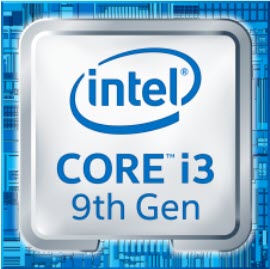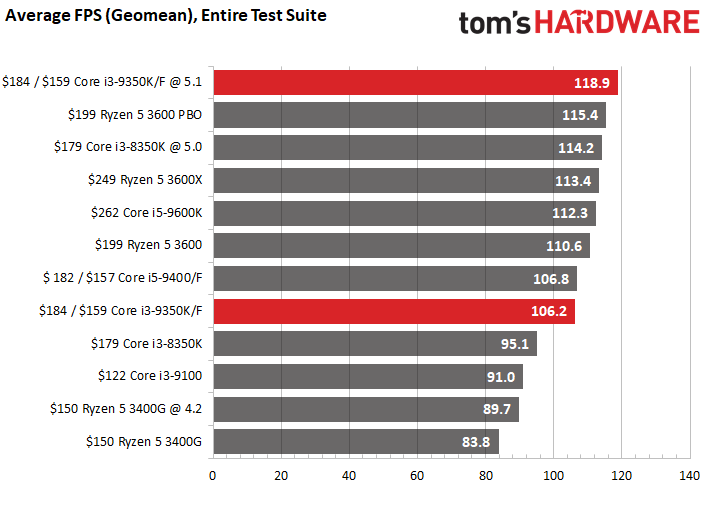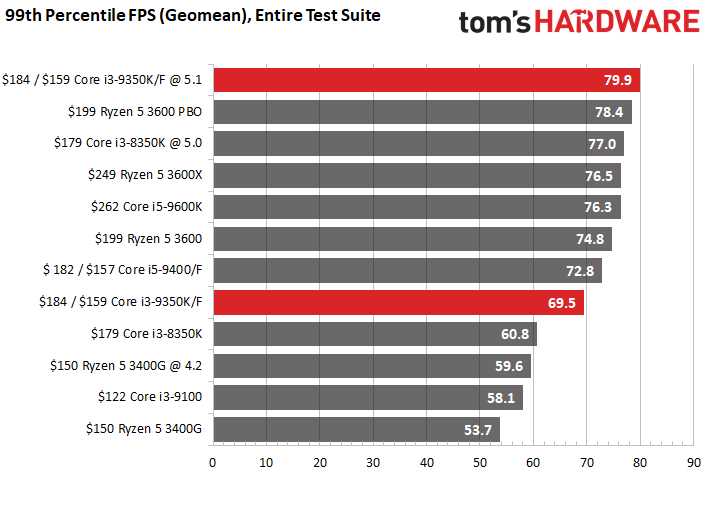Why you can trust Tom's Hardware
Intel's textbook incrementalism with its 14nm process and Skylake architecture, which involves slowly adding features with each generation as opposed to radical new improvements that stem from new process technology or architectures, has served as the company's only respite to fight off AMD's Ryzen assault.

That approach helped slow AMD's advance with the first- and second-gen Ryzen models, but Intel's addition of Turbo Boost 2.0 to the Core i3-9350KF doesn't offer enough tangible gains to offset the advantages of third-gen Ryzen's access to the PCIe 4.0 interface, overclocking on B-series motherboards, and bundled coolers. The Core i3-9350K also simply can't compete with the Ryzen 5 3400G's integrated Radeon Vega graphics engine, though it is noteworthy that the 3400G's first-gen Zen architecture isn't as competitive in most of our application benchmark suite.
The picture is a bit different when we test with a discrete graphics card, however. In the chart below, we plot gaming performance using average frame rates and a geometric mean of the 99th percentile frame times (a good indicator of smoothness), which we then convert into a frame-per-second measurement. Bear in mind that we tested with an Nvidia GeForce GTX 2080 Ti at 1920x1080 to alleviate graphics-imposed bottlenecks. Differences between our test subjects would shrink at higher resolutions.


The Core i3-9350KF is undoubtedly the fastest processor in this range when paired with a high-end graphics card, but we fully expect enthusiasts to use low- and mid-range video cards that will result in smaller deltas than we've recorded.
The stock Core i3-9350KF is much faster than its previous-gen counterpart at stock settings, which Intel likely uses to justify the $5 price increase, and it offers a slightly higher overclock ceiling that results in a tangible performance boost in games. However, in average frame rates, the Ryzen 5 3600 is 4% faster at stock settings and only trails by ~3% after tuning. As expected, those deltas shrink to the imperceptible range in our 99th percentile frame measurements. Given AMD's support for overclocking on B-series motherboards, the 3600's bundled cooler, and access to the PCIe 4.0 interface if you step up to X570 platform, the 3600's relatively small $15 premium is well worth the extra cash. Even the KF models' $25 discount, which you definitely won't find in full at retail, isn't enough to justify choosing the 9350KF over the Ryzen 5 3600.
The Ryzen 5 3400G isn't as competitive when paired with a discrete graphics card, but its leading integrated graphics performance is undisputed. If you're looking to game on integrated graphics at lowered resolutions and quality settings at a very friendly price point, the Ryzen 5 3400G is effectively the only realistic option in this price range. It's noteworthy that we only tested that processor at stock settings for today's review, but we're pushing the graphics engine and execution cores to their fullest for our upcoming review. Stay tuned.
Ryzen's dominance means the Intel Core i3-9350K/F only appeals to a small slice of the available user base. If we've said it once, we've said it a million times: Intel needs to open up overclocking, even if only in limited fashion, on B-series motherboards to maintain at least a modicum of platform price competitiveness.
Get Tom's Hardware's best news and in-depth reviews, straight to your inbox.
The Core i3-9350KF does excel at single-threaded work, largely due to Intel's new addition of the Turbo Boost 2.0 feature, but those gains aren't large enough to ignore Ryzen's overwhelming advantage in basically everything else, like productivity applications or in multi-tasking environments. The difference there is well worth every penny.
Overall, the Core i3-9350KF just doesn't offer enough of an advantage, even in gaming, to garner our recommendation at its price point. Not to mention that these processors have been subject to price gouging due to persistent shortages. You're better served by spending slightly more on a Ryzen 5 3600 and enjoying a lower overall platform cost and more performance in the majority of workloads, or stepping down a tier to the Ryzen 5 3400G if you're looking for a competent budget build. Intel's own Core i5-9400 is better suited for most users than the 9350KF, but it also falls before the Ryzen 5 3600, leaving the low-end and mainstream segments firmly in AMD's control.
MORE: Best CPUs
MORE: Intel & AMD Processor Hierarchy
MORE: All CPUs Content

Paul Alcorn is the Editor-in-Chief for Tom's Hardware US. He also writes news and reviews on CPUs, storage, and enterprise hardware.
-
g-unit1111 Is there any point in buying a 4/4 CPU on a platform that is becoming increasingly outdated anymore? Even for an office machine, a Ryzen 3400G is a more attractive CPU at that price.Reply -
Co BIY I would like to see some comment from the reviewers on the "snappiness" of the machines when powered by the various processors when doing various routine tasks. Do any of the benchmarks capture the "drive responsiveness" of the machine.Reply
I imagine that most those buying the lower end processors will be doing routine computer work like web browsing, word processing ect... I see that as the perfect use case for a very fast low core count processor. Feels fast in normal home/office use at a low cost. -
logainofhades Seeing recent reviews from GN, tech deals, and Hardware Unboxed, I am convinced 4 core/4 thread gaming, is essentially dead, at this point, unless you only play old titles that don't need more than 2-4 cores. The six core Ryzen 5's still keep going, where the i3 and i5 intels run out of steam, due to insufficient resources, being limited to 4 and 6 core without hyperthreading.Reply -
g-unit1111 Replylogainofhades said:Seeing recent reviews from GN, tech deals, and Hardware Unboxed, I am convinced 4 core/4 thread gaming, is essentially dead, at this point, unless you only play old titles that don't need more than 2-4 cores. The six core Ryzen 5's still keep going, where the i3 and i5 intels run out of steam, due to insufficient resources, being limited to 4 and 6 core without hyperthreading.
Yeah especially when you can get a 2nd gen Ryzen CPU for ridiculously cheap right now. Even the 3rd gen CPUs are still a relative bargain compared to their Intel counterparts. -
Giroro Replylogainofhades said:Seeing recent reviews from GN, tech deals, and Hardware Unboxed, I am convinced 4 core/4 thread gaming, is essentially dead, at this point, unless you only play old titles that don't need more than 2-4 cores. The six core Ryzen 5's still keep going, where the i3 and i5 intels run out of steam, due to insufficient resources, being limited to 4 and 6 core without hyperthreading.
I've been under the assumption that games are being optimized for 8 threads, because of the consoles.
I'll need to look into if 4c/8t outperforms 6/6 at gaming to see if that's true, even though 4 hyperthreaded cores are usually going to be worse than 6 physical cores at overall number crunching.
I wonder how console-comparable pre-ryzen 8-weak-core AMD processors hold up with modern games compared to 4 fast cores. -
ScrewySqrl ReplyGiroro said:I've been under the assumption that games are being optimized for 8 threads, because of the consoles.
I'll need to look into if 4c/8t outperforms 6/6 at gaming to see if that's true, even though 4 hyperthreaded cores are usually going to be worse than 6 physical cores at overall number crunching.
I wonder how console-comparable pre-ryzen 8-weak-core AMD processors hold up with modern games compared to 4 fast cores.
Anecdotally, I'm seeing a lot of "FX-8350 or better" in the 'recommended' listing of $50-60 games on Steam, so I'm guessing those older 8 cores are working better now that things are optimized for 8 cores. -
logainofhades ReplyGiroro said:I've been under the assumption that games are being optimized for 8 threads, because of the consoles.
I'll need to look into if 4c/8t outperforms 6/6 at gaming to see if that's true, even though 4 hyperthreaded cores are usually going to be worse than 6 physical cores at overall number crunching.
I wonder how console-comparable pre-ryzen 8-weak-core AMD processors hold up with modern games compared to 4 fast cores.
Games are starting to use more threads, because of Ryzen, really. Hence Intel finally pushing core counts higher, across all product lines. I would expect a 6c/6t to do better, than a 4c/8, but still suffer from frametime issues, a 6c/12t CPU like an intel 8700k, or a Ryzen 5 3600, would not. -
mdd1963 Just how many times can the 7600K be recycled, bumped up 100 MHz, given a new name, and called 'new'....Reply
This processor should be $59 , and a questionable purchase even then, but, it is NEVER worth $180+....(Intel, trim it's price by 60-70% , pronto..!) -
mdd1963 The review actually discusses the advantages of PCI-e 4.0? Honestly, with no GPUs yet available using it, and, I rather doubt anyone pondering this rig or an R5-1600 or less is pondering the latest NVME 4.0 drive on an X570 onslaught at 50-70% increased NVME storage cost but often an actual .1% longer 50 GB file transfer vs. the 970 EVO in real world testing.Reply -
logainofhades Replymdd1963 said:The review actually discusses the advantages of PCI-e 4.0? Honestly, with no GPUs yet available using it, and, I rather doubt anyone pondering this rig or an R5-1600 or less is pondering the latest NVME 4.0 drive on an X570 onslaught at 50-70% increased NVME storage cost but often an actual .1% longer 50 GB file transfer vs. the 970 EVO in real world testing.
While the are not taking advantage of the bandwidth, AMD's NAVI cards are PCI-E 4.0. X570 is not compatible with 1st gen Ryzen. Only a 3rd gen CPU, with an x570, gets you PCI-E 4.0. I do agree that PCI-E 4.0, is not really necessary, for the average user, at this time.